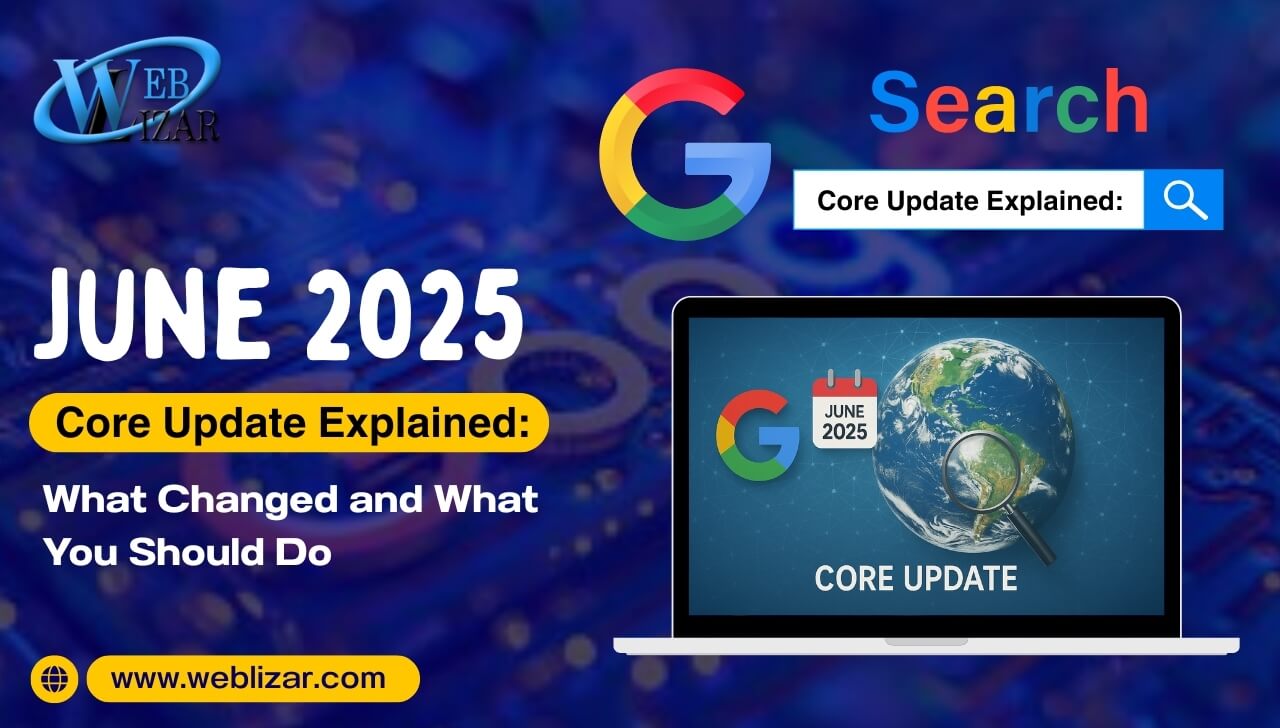Google’s June 2025 Core Update Explained: What Changed and What You Should Do

- AI , AI-Enabled Solution , Artifical intelligence , Artificial Intelligence , Audience Engagement , Benefits of SEO , Digital Marketing , Google core update , Google update
- AI Content Penalty, Algorithm Recovery, EEAT, Google Core Update 2025, June 2025 Update, SEO Ranking, wordpress seo
If you noticed wild swings in your website traffic over the past two weeks, you’re not alone. Google rolled out its June 2025 Core Update starting June 30—and after 17 days of algorithmic shakeups, it officially wrapped up on July 17.
As always, this wasn’t a minor tweak. It was a broad core update—the kind that reshuffles search rankings across industries. Some sites surged to the top, while others saw their traffic nosedive.
So, what changed? Who got hit? And most importantly, what should you do now?
Let’s break it all down.
What Is a Google Core Update?
Core updates are Google’s way of refining how it understands and ranks content. They’re not penalties, but recalibrations—meant to promote the most relevant, helpful, and trustworthy pages.
Unlike spam updates that target specific rule-breakers, core updates affect everyone. That means even compliant, high-performing websites can see ranking shifts.
Timeline of the June 2025 Update
-
Start Date: June 30, 2025 (morning rollout)
-
Major Fluctuations: July 2–6
-
Completion Date: July 17, 2025
-
Duration: 16 days, 18 hours
Key Changes in This Update
1. People-First Content Gets a Boost
Google sharpened its focus on helpful, original content. Pages that provided value, solved real problems, or answered niche questions performed better.
2. Stronger Emphasis on EEAT
If your site clearly demonstrates Experience, Expertise, Authoritativeness, and Trustworthiness, you’re likely in a better position. Sites lacking author bios, credentials, or transparency slipped.
To enhance credibility, many website owners are now using tools like Testimonials Pro to showcase genuine user reviews—one of the easiest ways to strengthen trust signals.
3. AI-Generated Fluff? Google’s Not Buying It
Thin, AI-generated, or overly templated content lost visibility—especially if it wasn’t reviewed or improved by humans.
4. YMYL Sites Under the Microscope
Industries like health, finance, education, and legal saw big shifts. Google wants these pages to be written by real experts with real insights.
If you manage educational portals, consider investing in structured, secure tools like School Management System by Weblizar to build long-term authority and compliance.
5. Backlinks Matter—But Relevance Rules
Quantity of links isn’t enough anymore. Google now values contextual, topic-relevant backlinks more than ever. Links from low-authority or unrelated sites lost value.
Who Got Hit the Hardest?
-
Affiliate Sites – Especially those with shallow product roundups
-
Health & Finance Blogs – Without real credentials or up-to-date advice
-
AI-Heavy Portals – Pages generated quickly, without originality
-
Low-Effort Educational Content – Outdated, copied, or generic guides
Who Gained the Most?
-
Niche Authority Sites – With deep, topic-focused content
-
Websites with Updated EEAT Signals – Author bios, credentials, and trust indicators
-
Content with Real Insights – Original research, expert commentary, and case studies
Want to boost user trust further? A simple upgrade like Admin Custom Login Pro can make your backend more secure and professional-looking—ideal for business sites and member portals.
What To Do If Your Rankings Dropped
✅ Step 1: Perform a Quick SEO Check-Up
Use tools like Google Search Console, Semrush, or Ahrefs to spot traffic drops by keyword, page, or region.
✅ Step 2: Run a Content Audit
-
Delete or combine thin or duplicate content
-
Expand short pages with helpful information
-
Fix outdated or irrelevant posts
✅ Step 3: Improve EEAT
-
Add author bios and expertise credentials
-
Include real images, stats, and proper citations
-
Build trust with SSL, privacy policies, and transparency
✅ Step 4: Avoid Reactionary Overhauls
Don’t panic. Let rankings settle before making massive changes. Focus on long-term quality improvements.
How to Future-Proof Against Google’s Next Update
-
Create content for people, not search engines
-
Focus on originality, clarity, and usefulness
-
Build real-world authority in your niche
-
Refresh your content regularly
-
Diversify your traffic through email, social media, and direct channels
And don’t underestimate technical optimization. Tools like Advanced Google Maps Plugin can add powerful functionality to your pages while improving user experience and SEO.
Also Read : AI Image Recognition: How Does It Work 2025
Final Thoughts
The June 2025 Core Update is another strong reminder that there are no shortcuts in modern SEO. If your content isn’t helpful, original, or credible—it’s going to be filtered out.
The good news? Google is rewarding the kind of content and experience Weblizar has always advocated for: trustworthy, user-first, and professionally delivered.
If your site was impacted, don’t view it as a penalty—see it as an opportunity to improve. Rebuild with value. Optimize for real people. And use tools like those at Weblizar.com to deliver faster, safer, and more user-friendly websites moving forward.



Leave a Reply